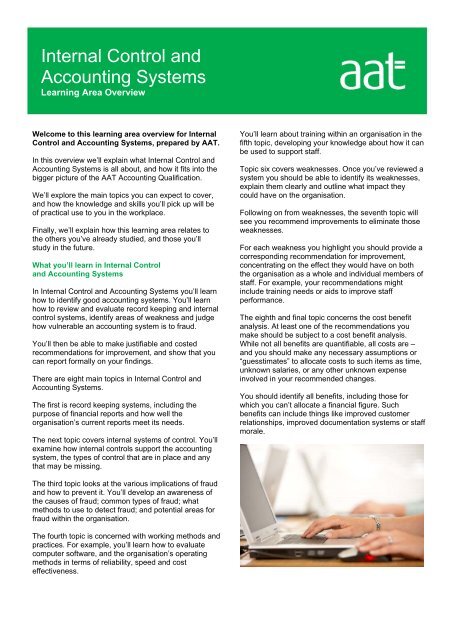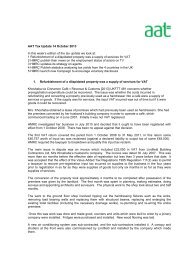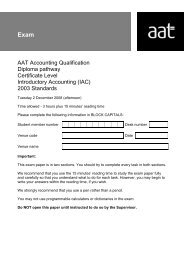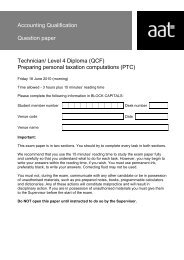internal control and accounting systems - learning area ... - AAT
internal control and accounting systems - learning area ... - AAT
internal control and accounting systems - learning area ... - AAT
You also want an ePaper? Increase the reach of your titles
YUMPU automatically turns print PDFs into web optimized ePapers that Google loves.
Internal Control <strong>and</strong>Accounting SystemsLearning Area OverviewWelcome to this <strong>learning</strong> <strong>area</strong> overview for InternalControl <strong>and</strong> Accounting Systems, prepared by <strong>AAT</strong>.In this overview we’ll explain what Internal Control <strong>and</strong>Accounting Systems is all about, <strong>and</strong> how it fits into thebigger picture of the <strong>AAT</strong> Accounting Qualification.We’ll explore the main topics you can expect to cover,<strong>and</strong> how the knowledge <strong>and</strong> skills you’ll pick up will beof practical use to you in the workplace.Finally, we’ll explain how this <strong>learning</strong> <strong>area</strong> relates tothe others you’ve already studied, <strong>and</strong> those you’llstudy in the future.What you’ll learn in Internal Control<strong>and</strong> Accounting SystemsIn Internal Control <strong>and</strong> Accounting Systems you’ll learnhow to identify good <strong>accounting</strong> <strong>systems</strong>. You’ll learnhow to review <strong>and</strong> evaluate record keeping <strong>and</strong> <strong>internal</strong><strong>control</strong> <strong>systems</strong>, identify <strong>area</strong>s of weakness <strong>and</strong> judgehow vulnerable an <strong>accounting</strong> system is to fraud.You’ll then be able to make justifiable <strong>and</strong> costedrecommendations for improvement, <strong>and</strong> show that youcan report formally on your findings.There are eight main topics in Internal Control <strong>and</strong>Accounting Systems.The first is record keeping <strong>systems</strong>, including thepurpose of financial reports <strong>and</strong> how well theorganisation’s current reports meet its needs.The next topic covers <strong>internal</strong> <strong>systems</strong> of <strong>control</strong>. You’llexamine how <strong>internal</strong> <strong>control</strong>s support the <strong>accounting</strong>system, the types of <strong>control</strong> that are in place <strong>and</strong> anythat may be missing.You’ll learn about training within an organisation in thefifth topic, developing your knowledge about how it canbe used to support staff.Topic six covers weaknesses. Once you’ve reviewed asystem you should be able to identify its weaknesses,explain them clearly <strong>and</strong> outline what impact theycould have on the organisation.Following on from weaknesses, the seventh topic willsee you recommend improvements to eliminate thoseweaknesses.For each weakness you highlight you should provide acorresponding recommendation for improvement,concentrating on the effect they would have on boththe organisation as a whole <strong>and</strong> individual members ofstaff. For example, your recommendations mightinclude training needs or aids to improve staffperformance.The eighth <strong>and</strong> final topic concerns the cost benefitanalysis. At least one of the recommendations youmake should be subject to a cost benefit analysis.While not all benefits are quantifiable, all costs are –<strong>and</strong> you should make any necessary assumptions or“guesstimates” to allocate costs to such items as time,unknown salaries, or any other unknown expenseinvolved in your recommended changes.You should identify all benefits, including those forwhich you can’t allocate a financial figure. Suchbenefits can include things like improved customerrelationships, improved documentation <strong>systems</strong> or staffmorale.The third topic looks at the various implications of fraud<strong>and</strong> how to prevent it. You’ll develop an awareness ofthe causes of fraud; common types of fraud; whatmethods to use to detect fraud; <strong>and</strong> potential <strong>area</strong>s forfraud within the organisation.The fourth topic is concerned with working methods <strong>and</strong>practices. For example, you’ll learn how to evaluatecomputer software, <strong>and</strong> the organisation’s operatingmethods in terms of reliability, speed <strong>and</strong> costeffectiveness.
How Internal Control <strong>and</strong> Accounting Systemswill help you in the workplaceThe skills you gain in Internal Control <strong>and</strong> AccountingSystems are used in many <strong>accounting</strong> roles. Theyinclude accounts office supervisors, <strong>accounting</strong>technicians working on clients’ <strong>systems</strong>, credit <strong>control</strong>managers, <strong>internal</strong> audit assistants <strong>and</strong> any otheraccounts role where an ad hoc task of reviewing<strong>systems</strong> is needed.For example, you might have a client who asks you toset up a new <strong>accounting</strong> system. In such a case you’dneed to be able to consider record keeping <strong>systems</strong>,<strong>internal</strong> <strong>control</strong> <strong>and</strong> how to reduce the possibility offraud.Or you may be asked to review an existing <strong>accounting</strong>system, or a part of that system, which would meanyou’d need to consider the points we’ve mentioned here<strong>and</strong> make recommendations for improvements.How Internal Control <strong>and</strong> Accounting Systemsrelates to other <strong>learning</strong> <strong>area</strong>sIn addition to Internal Control <strong>and</strong> Accounting Systems,you’ll need to take three other compulsory <strong>learning</strong><strong>area</strong>s at level 4. These are:• Financial Statements• Budgeting• Financial Performance.There are also four optional <strong>learning</strong> <strong>area</strong>s at level 4,of which you’ll need to take two:• External Auditing• Credit Management <strong>and</strong> Control• Personal Tax• Business Tax.Internal Control <strong>and</strong> Accounting Systems relates veryclosely to some of the compulsory <strong>and</strong> optional<strong>learning</strong> <strong>area</strong>s at this level.You’ll need a good knowledge of financial statementsto ensure you can review the record keeping <strong>systems</strong>in an organisation.Both budgetary <strong>control</strong> <strong>and</strong> financial performance <strong>area</strong>reas of <strong>accounting</strong> <strong>systems</strong> that you might need toreview in order to identify weaknesses that needimproving.The optional <strong>area</strong>s of External Auditing <strong>and</strong> CreditManagement <strong>and</strong> Control relate very closely to InternalControl <strong>and</strong> Accounting Systems.Auditing can highlight weaknesses in <strong>internal</strong> <strong>control</strong><strong>systems</strong>, while examining credit management canexpose vulnerabilities which your recommendationsmay be able to improve.Internal Control <strong>and</strong> Accounting Systems also followson from the level 2 <strong>learning</strong> <strong>area</strong>, Working Effectivelyin Accounting <strong>and</strong> Finance. This is because you’ll needto be able to communicate the findings of your revieweffectively in a written report.Internal Control <strong>and</strong> Accounting Systems also buildsupon Basic Accounting at level 2, <strong>and</strong> AccountsPreparation at level 3, as you need to underst<strong>and</strong> the<strong>accounting</strong> system to review the record keeping <strong>and</strong><strong>internal</strong> <strong>systems</strong> of <strong>control</strong>.

















